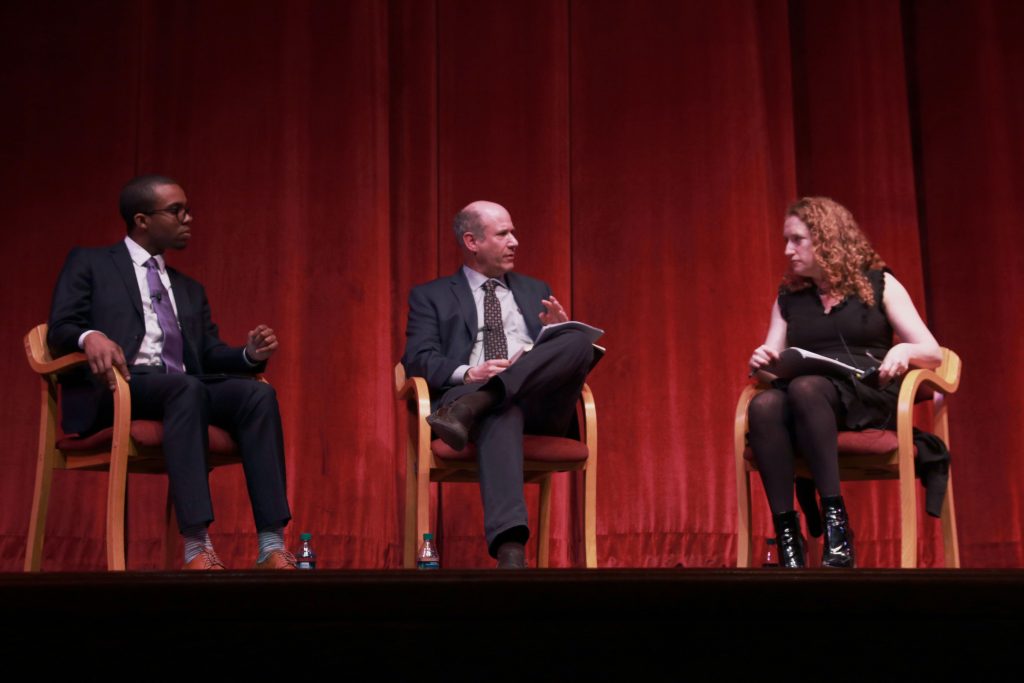Students spoke out against the Binghamton University administration during an open forum on freedom of speech Wednesday afternoon, criticizing the administration’s lack of response to recent controversies.
The forum, titled “Campus Speech: What are the Limits?” was held at the Anderson Center and hosted by Jonathan Karp, chair of BU’s Faculty Senate and associate professor of Judaic studies.
The panelists included Karp; Jermel McClure, the president of the Student Association (SA) and a senior majoring in political science; and Suzanne Nossel, executive director of PEN America, an organization that aims to defend freedom of expression and works with universities throughout the nation.
The event followed recent controversies concerning freedom of speech on campus, including a homophobic article published by the Binghamton Review and police response to students posting contentious flyers at the University Downtown Center (UDC). The flyers condemned racist incidents that occurred on campus during this academic year.
The HDEV Emancipation and Activism Taskforce (HEAT), the student collective that was responsible for posting the flyers, sent out a statement to the College of Community and Public Affairs on Wednesday morning.
“By posting flyers and continuing to have conversations about racism, we were exercising our civil right to free speech, which was recently supported by President Harvey Stenger himself,” the statement said. “Ironically, our peaceful actions were immediately criminalized while all these messages of support were being circulated around campus.”
Before the panel discussion, Nossel spoke about her experience working with universities and said college campuses have been undergoing a dramatic change in demographics, which is inevitably changing the discourse at schools across the country.
“The assimilationist model that prevailed for decades when campuses first began to integrate is being tested,” Nossel said. “Increasingly, diverse student bodies are asking universities to revisit traditions and established practices in order to take better account of the needs of students today.”
After Nossel’s talk, Karp mediated a discussion between the panelists, prompting questions about the ways that students view freedom of speech on college campuses.
The discussion turned into a Q&A in which attendees were given a chance to comment and ask questions about the content discussed during the forum.
Dominic Davy, a first-year graduate student studying public affairs, voiced his frustration with the direction of the event and its lack of focus on recent campus issues, including the police response to students posting flyers at the UDC.
“I came here excited, thinking we were going to talk about recent events and put a face on certain problems that are affecting students, but I’m shaking and my voice is shaking and cracking, not because I’m nervous but because I’m really upset,” Davy said. “We’re talking about issues in a very ambiguous and hypothetical way. Things are happening. People are feeling unsafe here, people fear retribution for speaking up and utilizing that free speech that we’re encouraging.”
Davy also asked why an SA-chartered organization like the Binghamton Review was allowed to publish hate speech. But McClure said the SA cannot pick and choose which organizations are given money. He said the SA Executive Board did what they could by condemning the Binghamton Review’s homophobic article.
Kalissa Sawyer, the president of the Latin American Student Union, the vice president of SHADES and a senior majoring in human development, said she was disappointed that the forum was not addressing the issues students of color are facing on campus.
“Every single year that I’ve gone here, something has happened that has hurt my community,” Sawyer said. “A racial incident has happened and the administrators have done virtually nothing about the problems we face and instead they hid behind silencing our voices.”
During Nossel’s response to Sawyer’s comments, Davy and several other students spoke out from the audience, questioning the effectiveness of this forum and demanding more action from the administration.
Karp said he believes there should be other forums in the future to address the issues put forth by students.
“This is a chain of experiences and it reflects a wider perception among a sector of the student body that there is a great deal of racism and other kinds of bigotry and discrimination on campus that aren’t being adequately addressed by the administration,” Karp said. “Now, is that true? I’m sure there is some truth to it, but I think the truth of it has to be elicited through info, facts, debate and discussion. And this forum couldn’t do that, but we should have other forums to address that.”



